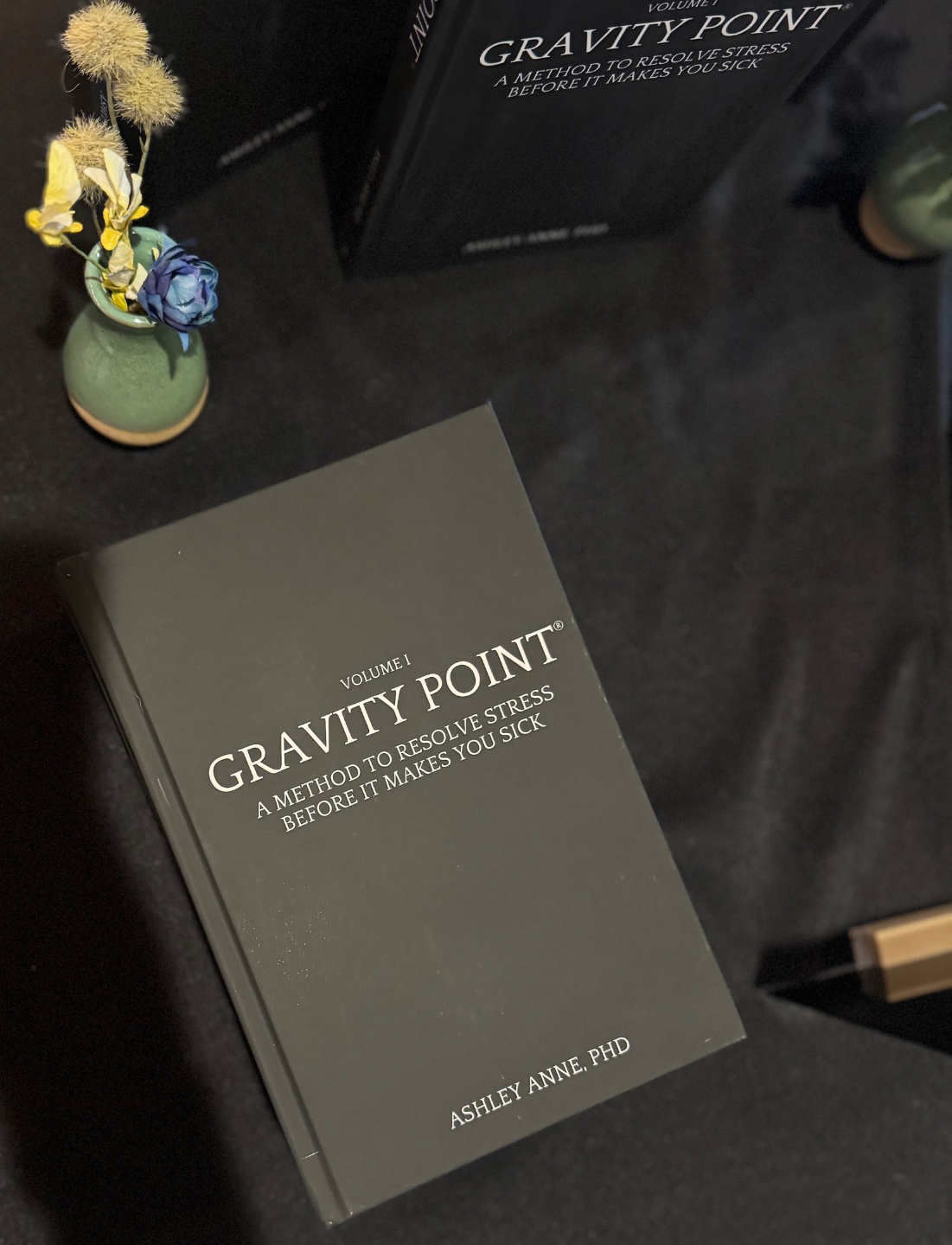DR. ASHLEY ANNE PRESENTS
GRAVITY POINT®
A Method to Resolve Stress & Trauma Before It Makes You Sick
Learn the step-by-step system to transform obstacles into opportunities, pain into purpose, and stress into a superpower.
Buy the BookRestore Your Well-Being
Master the science of stress and a paradigm of prevention.

Resolve Trauma
Take everything that has happened to you and make it work for you.

Reclaim Your Light
Become a beacon of hope and healing for everyone around you.
The New Science of Stress
Gravity Point® (Volume 1): A Method to Resolve Stress and Trauma Before It Makes You Sick gives you a cutting-edge framework for understanding and healing stress and trauma in a groundbreaking new way.
Inside this book, you'll discover:
- 20 distinct stress responses that move the stress model far beyond fight, flight, and freeze
- Why unresolved stress creates dysregulation and how dysregulation leads to physical disease, mental disorder, and relational discord
- How to heal past trauma using present day stress
- Practical practices you can use immediately when stress strikes
- A universal step-by-step method you can follow during triggering situations to resolve stress, and prevent and heal trauma at the very same time
Part I presents the Gravity Point® Model, an update to our understanding of stress that translates research so it’s practical and applicable to everyday life. Part II provides the Gravity Point® Method, an easy-to-follow protocol that resolves stress and heals trauma in any triggering situation.
Buy the Book
Part I: Gravity Point® Model and the Science of Stress
Part II: Gravity Point® Method and the 20 F’s of Stress
Hey there - I’m Ashley Anne, PhD
I was sick for most of my life, plagued by mystery illnesses, anxiety, and crippling depression. Even after becoming a PhD-level trauma therapist with some of the best training on the planet, I burnt out within six months and I was sicker than ever.
I had to make a difficult decision: Was I going to keep listening to the experts outside of me saying there was nothing more I could do? Or was I going to start listening to the expert inside of me that was screaming "there has to be a better way?"
I chose to honor my inner GPS and over the course of many years, it guided me through an in-depth research study that covered neuroscience, yoga, quantum mechanics, metaphysics, and so much more. As I discovered a more complex model of stress and the step-by-step system to resolve it, I began to heal every part of my life. And when I taught it to others, I witnessed them make changes in minutes that used to take months.
What I discovered became Gravity Point®, a collection of new models and methods for understanding and resolving stress and trauma before they make you sick.
Gravity Point® isn't a personal wellness program. It’s a completely new paradigm of prevention.
Gravity Point® was built using a more complex, detailed framework for understanding stress and trauma, one that better aligns with what our systems actually do. I’ve gathered everything I’ve learned into the Gravity Point® Anthology to make this work accessible and affordable.
My hope is that it helps you become more happy, healthy, and whole.
Read My Story

Gravity Point® is for you if:
- You've tried therapy, coaching, yoga, or other healing modalities but haven't found lasting relief from the patterns that keep you stuck.
- You're new to the wellness world or trauma-informed approaches and want a structured, science-backed method that truly works.
- You're both spiritual and scientific, so you’re seeking approaches grounded in science that also honor the deeper dimensions of human experience.
- You're highly sensitive, deeply empathic, or neurodivergent, and you need a system that accounts for how your system actually works.
- You’re overwhelmed by other people’s stress, and you’re looking for a framework that helps you resolve what you pick up from others’ systems.
- You're a practitioner, coach, or therapist looking for a comprehensive framework to help your clients resolve stress at its source.
- You’re done using trial and error trying to find an approach to well-being that works for you.
- You recognize the effects of oppression in the world and are seeking ways to eradicate it.
DR. ASHLEY ANNE PRESENTS
THE GRAVITY POINT® PODCAST
The Gravity Point® Podcast is a safe haven for sensitive and neurodivergent folks to learn the art and science of stress and trauma resolution so they can heal themselves and the world around them. Together, we'll blend neuroscience, yoga, quantum physics, and metaphysics to reveal how you can resolve stress, transcend trauma, and reclaim control over your life for good.
Listen on YouTube, Spotify, or Apple Podcasts.
LAUNCHING FEBRUARY 2026

Gravity Point® Stories
The Gravity Point® Method has helped me learn about who I am and how I’ve developed into the human I’ve become. For most of my life, I felt unwanted and unimportant. I felt like there was something wrong with me. Understanding myself through the Gravity Point® Paradigm has improved my mental and physical health immensely. I struggled with depression, anxiety, migraines, and IBS prior to using the Method. I’ve also been able to understand deep emotional trauma and understand the steps to take to heal. I will forever be grateful for everything I’ve learned and continue to learn because my life has improved beyond measure.
- Brandy


The Gravity Point® Method really put puzzle pieces of "living" together for me. Dr. Anne's depth and breadth of experiences, knowledge and application of SO MANY different fields of study created this big picture of life for me. Every lesson was like a new "ah-ha" or "I knew it!" Working with the Method truly highlights Dr. Anne's gifts as a coach and intuitive empath as it helped me understand myself on a deep level very quickly. I found the work inspiring and empowering. The Method is truly profound and I will continue to learn more and apply the principles throughout my life. So happy I said "yes"!
- Nurse Jesse
Free Welcome Gift
Sign up for our newsletter and receive the free Gravity Point® Method Guidebook, a complete introduction to 20 stress responses and the steps you can take right now to resolve them.
